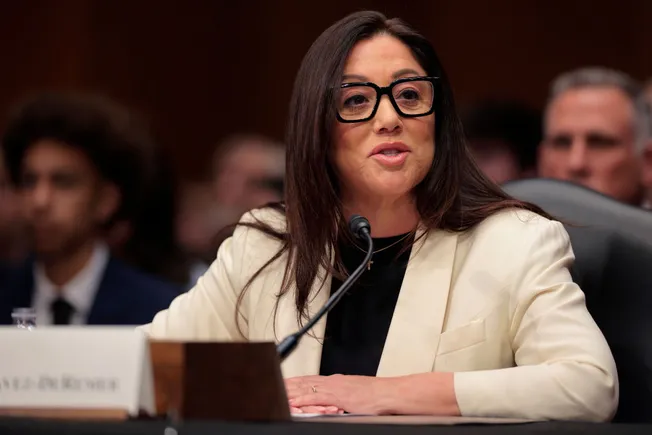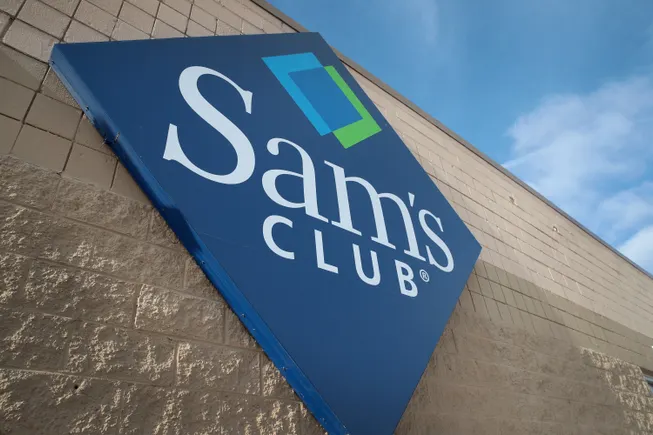WASHINGTON, D.C. — Lori Chavez-DeRemer, who was previously criticized for straddling the line between pro-union and pro-employer, played up her ability to move between worlds and represent all kinds of workers during her confirmation hearing Wednesday.
Turnout was steep for the hearing, leading to the creation of an overflow room in the Dirksen Senate Office Building. Viewers were taut with attention as members of the U.S. Senate Committee on Health, Education, Labor & Pensions drilled Donald Trump’s pick to head the Department of Labor.
But first, in her opening testimony, Chavez-DeRemer gave listeners a glimpse into her lived experience to help contextualize her seeming contradictions as a Trump pick with a pro-labor record.
The one-time congresswoman from Oregon grew up with a father who worked in a creamery and was a member of the Teamsters union. She and her husband also ran a small business together, giving her insight into the challenges facing employers.
With manufacturing layoffs and the need for trade skilling top of mind, the DOL nominee outwardly reinforced her commitment to American workers.
Republicans, Democrats unleash PRO Act questions
The HELP Committee’s chairman, Sen. Bill Cassidy, R-La., and its ranking member, Sen. Bernie Sanders, I-Vt., both came out swinging.
Cassidy needled Chavez-DeRemer for her co-sponsorship of the Protecting the Right to Organize (PRO) Act, a proposed law that would expand labor protections.
Chavez-DeRemer acknowledged Cassidy’s concerns.
“I recognize that I’m no longer the lawmaker, and I do not believe that the secretary of labor should write the laws. It will be up to Congress to write those laws and to work together,” she said. “What I believe is that the American worker deserves to be paid attention to.”
“I was working for Oregon’s 5th Congressional District in representing that. I wanted to be at that table. I never want to be left out of a conversation,” she explained of her PRO Act sponsorship. “I respect the right of the ‘right-to-work’ states. And I have said that the bill was imperfect.”
Cassidy outlined further concerns, such as unions appealing to corporations and, in some cases, circumventing employers at the franchise level. “Do you believe federal law should prioritize policies that help small businesses thrive, rather than imposing new regulatory hurdles which could hinder their success?” he asked.
“It’s important [to recognize] that the president’s goal is to uplift all business owners and uplift all American workers,” she said, adding that understanding the franchise model is “important” in the U.S. “I supported the overturning of the NLRB rule on joint employers to support the franchise business model, and supported the president in this,” Chavez-DeRemer said.
Cassidy also expressed worry that independent contractors could lose their flexibility at work and pressed Chavez-DeRemer to refrain from imposing any rules that could lead to that result.
“I commit to working with you on supporting independent contractors through this process,” she said. She also underscored Trump’s support for rule during his first administration.
On the other side of the aisle, Sanders led by bringing up the current popularity of unions among the American workforce. Coming from a different ideological perspective, Sanders demanded to know if Chavez-DeRemer no longer supported the PRO Act.
“I support the American worker,” she said, sparking Sanders’ famous ire and impatience — drawing dry laughter from onlookers.
Sanders got the DOL nominee to admit that perhaps minimum wage may need to be reexamined — although, what works in Portland, Oregon, is “not going to work for Grants Pass, Oregon,” she said.
Still, the National Labor Relations Board’s lack of a quorum was what Sanders truly grilled Chavez-DeRemer about, again and again. “Do you believe that the firing of Ms. Wilcox was illegal?”
“President Trump has a right to exercise his executive power how he sees,” she said.
“Are you concerned that we do not have a functioning NLRB right now?” Sanders continued.
“The NLRB is separate from the Department of Labor,” the DOL pick said. “But I do believe that the function of the NLRB is important, and I will always take that into consideration.”
The ethics of DOGE accessing DOL’s data came up
Along with child labor concerns, which were a recurring talking point on both sides of the aisle, Sen. Patty Murray, D-Wash., questioned Chavez-DeRemer’s commitment to ethics.
First, Murray asked about a misallocation of funds, to which the DOL nominee responded, “The president of the United States has the power to determine what he’s going to do through his executive power.”
“Will you follow the law?”
“I will always follow the law and the constitution.”
“If you receive a directive to violate appropriations laws and withhold funding for workers, what will you do?” Murray pressed.
“I do not believe the president is going to ask me to break the law,” Chavez-DeRemer responded.
Then, Murray extended her questioning to the Department of Government Efficiency. She outlined the conflict of interest in DOGE being headed by Elon Musk, who, as CEO of Tesla and SpaceX, has faced investigations from Department of Labor agencies whose data he now has accessed.
She also mentioned insider trading concerns; with this context, she asked the potential secretary if she would protect private data held by the department.
“I will always protect the Department of Labor and those issues,” Chavez-DeRemer said.
A moment of unity, levity amid tense debate
Sen. Markwayne Mullin, Lori Chavez-DeRemer and Sean O’Brien stand side by side on Feb. 19, 2025.
@Teamsters on X
Prior to introducing Chavez-DeRemer, Sen. Markwayne Mullin, R-Okla., took the opportunity to acknowledge Teamsters Union President Sean O’Brien, who was present at the hearing.
While the Teamsters did not endorse a presidential candidate this past election, O’Brien did speak at the 2024 Republican National Convention. (Reportedly, O’Brien sought to speak at the Democratic National Convention to no avail.) Just last week, the Teamsters also endorsed Chavez-DeRemer as the DOL Secretary pick.
Not only was O’Brien’s presence noteworthy, but Mullin’s nod to him was poignant.
Previously, O’Brien and Mullin butted heads during a November 2023 committee hearing, which led to a heated exchange on X and an invitation to physically fight one another.
Mullin’s acknowledgment of his “new friend” O’Brien elicited chuckles, but the Oklahoma senator had a point: Chavez-DeRemer was “uniquely positioned” to bring past foes together.
“I would hope that you would set your biased opinions to the side, and understand that this is a negotiation between two [factions] of the party, that is saying, ‘We are willing to work together,’” Mullin said.
What to expect from Chavez-DeRemer
Despite maintaining a calm, level demeanor, the DOL pick managed to evade a number of questions. She frequently reminded senators that she was no longer a member of Congress, and that the goal of the DOL was not lawmaking — but that she would help enforce whatever bills Congress passed.
When senators, like Sanders, pressed her and asked her what she would do or say “if” she was in his position, she simply responded that she wasn’t in that position, leaning on phrases like “I haven’t even stepped foot into the DOL” and “I haven’t been read into that.”
At one point, Murray pressed her further about misappropriated funds — not accepting her answer that the president wouldn’t ask Chavez-DeRemer to do something illegal.
“We have seen that across the board since he was put into office where he is violating that law, so you will likely be asked,” Murray said, pushing back. “What will you do?”
“Well, it’s a hypothetical. I have not talked to the president on this issue,” Chavez-DeRemer said. “I do not believe the president would ever ask me to violate the law.”





Leave a Reply